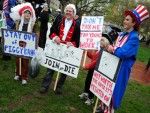Being Right: Populism Problem

Like it or not, the Tea Party and its candidates will have an enormous impact on the 2010 election, and perhaps the future of American politics. Taken as a whole, the Tea Party seems to have divergent objectives, as it draws together the most vocal elements of libertarianism and social conservatism in the Republican Party. Yet conservatism and liberty are not the dominant threads woven into the Tea Party’s fabric. No, the philosophy that best characterizes the organization’s disposition is, as many pundits have pointed out, populism. Populism pits one section of the population: the majority “masses” or “people,” against the minority ruling class or “elites.” The populist movement has taken many forms throughout American history, from silver supporter William Jennings Bryan to corrupt New Orleans socialist Huey Long. Now, populism finds a new home in the Tea Party. While populist ideals may be initially exciting, they can have negative long-term political consequences.
Today’s Tea Party, like most populist movements, is not so much an endorsement of something new as it is a reaction against the current establishment. The Tea Party opposes the Obama administration and its legions of intellectual, socially and environmentally conscious, hipster fans. Essentially, it is like every other populist movement: it proposes big changes in government and rejects the elites that dominate the current political system. This movement is no different from the populism of William Jennings Bryan. In 1896, Bryan gathered a radical coalition of farmers and free traders to run on the Democratic ticket against the pro-corporation, William McKinley-led Republican Party. Bryan’s run had important long-term implications for the political state of the nation. The populist platform was too radical to gain any short-term support and McKinley routed Bryan to renew an era of Republican dominance. However, Bryan’s populism created an ideological shift in American politics. From 1896 on, the Democratic Party became the defender of the underdog and both parties would have to account for the common man in ways they never did before. Bryan’s run also started a movement toward a new generation of American leaders, political outsiders and non-elites who were elected because of their appeal to the so-called average American.
This shift in American political culture due to populism has had both positive and negative consequences. Some populist leaders have proven very successful. The best example is Ronald Reagan, a B-movie actor from small town Illinois who became one of the most successful and influential presidents in American history. Yet for every Reagan there is a Jimmy Carter, a Georgia peanut farmer whose misguided leadership created four of the most demoralizing years of the twentieth century.
Increasing populist demands require political candidates to appeal to lowest common denominator over elites who might have make better legislators and executives. Barack Obama is the latest example of this trend. He appealed to the dregs of society with catchy slogans of “hope” and “change” without demonstrating that he was a competent leader. While it is a stretch to say Obama was the worst possible candidate for the job, there were several candidates more qualified to run the country that were dismissed based on perceptions of “elitism.”
While it opposes Obama and his followers directly, the Tea Party comes from the same roots that made Obama’s presidency possible. As a conservative with Libertarian leanings, it is easy for me to find favor with some of the specific views of Tea Party candidates. However, the overriding populism of the Tea Party movement should be of concern to any true American Conservative. While Tea Partiers claim kinship with the Founders of this nation, men like Thomas Jefferson, James Madison and John Adams came from the political elite of Massachusetts and were distinctly anti-populist. Yet they made effective founders and leaders, not because they were interested the concerns of the masses, but because they understood how to structure and run a nation. Practical knowledge, as opposed to intellectual prowess or mass appeal, is what American voters should look for in candidates. We do not need the Tea Party candidates that masquerade as common folk. Rather, we need a leader who will rise above the fray, someone who is willing to think for himself and strive for the good of the nation. Feel free to sympathize with the Tea Party’s sentiments when you vote in November. But be wary of the consequences populism can have for American politics.








